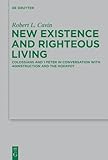New Existence and Righteous Living : Colossians and 1 Peter in Conversation with 4QInstruction and the Hodayot / Robert L. Cavin.
Material type: TextSeries: Beihefte zur Zeitschrift für die neutestamentliche Wissenschaft ; 197Publisher: Berlin ; Boston : De Gruyter, [2013]Copyright date: ©2013Description: 1 online resource (279 p.)Content type:
TextSeries: Beihefte zur Zeitschrift für die neutestamentliche Wissenschaft ; 197Publisher: Berlin ; Boston : De Gruyter, [2013]Copyright date: ©2013Description: 1 online resource (279 p.)Content type: - 9783110303827
- 9783110304039
- 227/.706 23
- BS2715.52 .C38 2013
- online - DeGruyter
- Issued also in print.
| Item type | Current library | Call number | URL | Status | Notes | Barcode | |
|---|---|---|---|---|---|---|---|
 eBook
eBook
|
Biblioteca "Angelicum" Pont. Univ. S.Tommaso d'Aquino Nuvola online | online - DeGruyter (Browse shelf(Opens below)) | Online access | Not for loan (Accesso limitato) | Accesso per gli utenti autorizzati / Access for authorized users | (dgr)9783110304039 |
Frontmatter -- Acknowledgements -- Contents -- Abbreviations -- Chapter 1: Introduction -- Chapter 2: Overview of Scholarship -- Chapter 3: 1 Peter: New Existence and Righteous Living -- Chapter 4: The Hodayot and Patterns of Thought in 1 Peter -- Chapter 5: Colossians: New Existence and Righteous Living -- Chapter 6: 4QInstruction and Patterns of Thought in Colossians -- Chapter 7: Summary and Conclusions -- Bibliography -- Index of Modern Authors -- Index of References
restricted access online access with authorization star
http://purl.org/coar/access_right/c_16ec
As the first comparative study of Colossians and 1 Peter, the book fills a lacuna by exploring each author’s understanding of the new existence and the means to righteous living. If the epistles end up offering almost identical paraenesis, why do they have such distinctive theological patterns of thought? The conventional starting point in Colossian and 1 Peter studies centers on the recipients’ needs. Much has been learned from these investigations and is kept in view. However, the extent to which each epistle’s theology reflects an underlying pattern of ideas within each author’s worldview is less well understood. Setting the author’s views in the context of the literature of early Judaism throws fresh light on his thought-world and understanding of the new existence and moral enablement. Evidence exists which indicates that streams of traditions in Early Judaism Literature, factors other than the recipients’ needs, contribute to the theology within each epistle and may account for distinctive aspects identified between Colossians and 1 Peter. Exploration of 4QInstruction and the Hodayot, texts discovered at Qumran, provides precedents, precursors, and parallels for the distinctive emphases investigated. Thus, they shed new light on each epistle.
Issued also in print.
Mode of access: Internet via World Wide Web.
In English.
Description based on online resource; title from PDF title page (publisher's Web site, viewed 28. Feb 2023)


